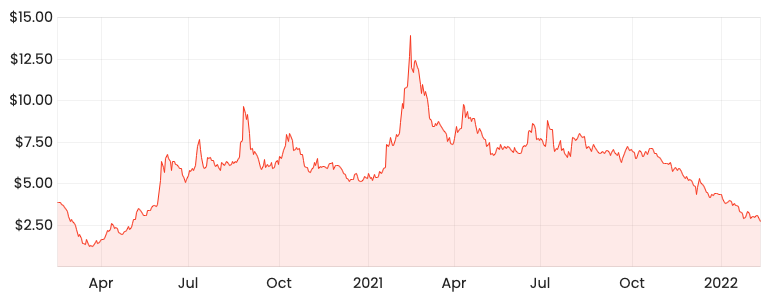The Zip Co Ltd (ASX: Z1P) share price is down 81% but investors should be cautious jumping in simply because of the dramatic decline.
Here’s why I’m avoiding Zip shares for now.
Z1P share price

What went wrong with the Zip share price?
From its high of $14.53 one year ago, the Zip share price has been skiing downhill to now rest at $2.73.
What is the 2022 outlook for the Zip (ASX: Z1P) share price?
A large part of the decline has stemmed from market sentiment.
Investors thought buy-now-pay-later (BNPL) would end the credit card industry, and banks would be at the mercy of Afterpay and Zip.
Subsequently, the Zip share price rocketed. Then main competitor Afterpay was swallowed up by Block Inc CDI (ASX: SQ2).
But as BNPL gained mainstream adoption, competitors fought back.
Paypal Holdings Inc (NASDAQ: PYPL) and Apple Inc (NASDAQ: AAPL) released their own copycat versions.
Commonwealth Bank of Australia (ASX: CBA) launched StepPay with no interest charges, no monthly or annual fees.
All of sudden, there was very little separating the army of BNPL companies.
Zip now looks like a commodity, with little pricing power or differentiation.
The two biggest risks to Zip
The biggest risks to the Zip share price is regulation and borrowing costs.
The UK regulator this week cracked down on the four BNPL operators for “potentially unfair and unclear” consumer contracts.
Customers were charged late fees after a product was returned. Loans should have been cancelled, but instead, fees were deducted from accounts.
There is also a growing community sentiment that BNPL should be regulated like any other credit product.
Currently, BNPL uses a regulatory loophole that exempts it from the National Consumer Credit Protection Act 2009 as it does not charge interest on its products.
If the Zip share price was to come under the jurisdiction of the Credit Act, it would have to conduct background and credit checks.
The result would be a slower onboarding process and therefore adoption, one of its key differentiators from traditional credit products.
The other major risk is fundings costs.
BNPL’s borrow money from banks or markets and then loan that money to customers via their pay in four instalment plans.
With interest rates on the rise, the funding cost for Zip shares will also increase, squeezing margins and profitability.
Zip could pass on the increased funding costs to consumers, but it would risk losing customers to competitors.
Overall, the Zip is stuck between a rock and a hard place.
And with risks and competition only increasing, I suspect there could be further downside left for the Zip share price.










